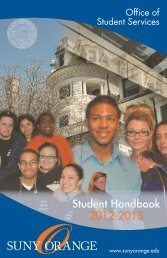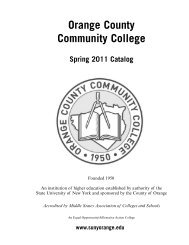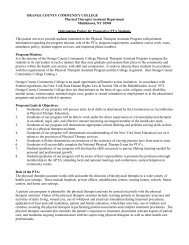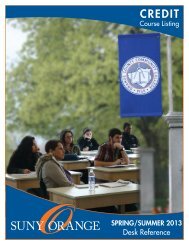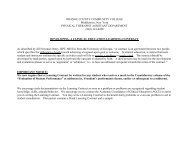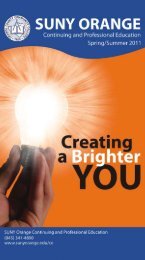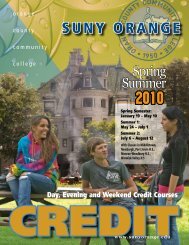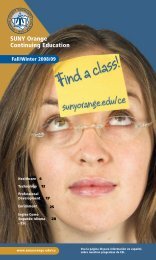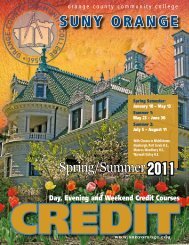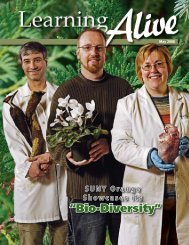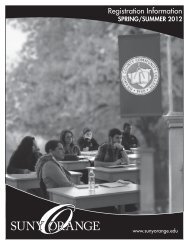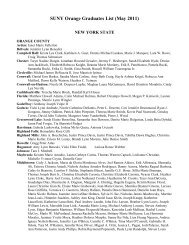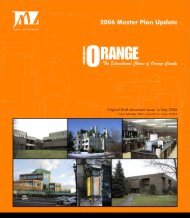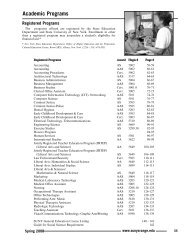You also want an ePaper? Increase the reach of your titles
YUMPU automatically turns print PDFs into web optimized ePapers that Google loves.
Medical Laboratory Technology<br />
MLT 103—lmmunology<br />
2 lect., 1 lab., 2 cr. (Fall)<br />
The immune system; its components, and their<br />
functions. Antigen-antibody reactions, cell-mediated<br />
immunity, the complement system, and pathological<br />
conditions are discussed. [R-1]<br />
MLT 104—Hematology<br />
2 lect., 3 lab., 3 cr. (Spring)<br />
Topics include blood cell formation, function,<br />
pathological states both physiological and genetic,<br />
hemoglobin-opathies, coagulation theory and factors.<br />
Laboratory exercises correlate basic tests with lecture<br />
topics. Test proficiency is developed utilizing manual<br />
and both automated and semiautomated techniques.<br />
[R-1]<br />
Corequisite: ENG 161<br />
MLT 105—Introduction to Laboratory Science<br />
1 lect., 2 lab., 2 cr. (Fall)<br />
A survey of the clinical laboratory profession with<br />
emphasis on basic skills as it applies to the<br />
instrumentation used. Lecture topics include safety,<br />
specimen handling, basic instruments, solutionmaking,<br />
and quality assurance. [R-1]<br />
Corequisite: ENG 160<br />
MLT 106—Microbiology for Health Professionals<br />
2 lect., 2 lab., 3 cr. (Fall/Spring/Summer)<br />
Overview of bacteria, yeasts, molds, protozoa and<br />
viruses in relation to the Allied Health Professions.<br />
Lectures deal with host-microorganism relationships.<br />
Laboratory includes use of the microscope, culture<br />
methods and destruction of micro-organisms. Sterile<br />
technique is stressed. [R-1]<br />
Prerequisite: one semester of a biological science or<br />
corequisite: concurrent enrollment in BIO 111<br />
MLT 109—Phlebotomy<br />
6 lect., 4 lab., 7 cr. (Fall/Spring)<br />
Training in drawing and handling blood samples for<br />
laboratory testing in hospitals, doctor's offices, and<br />
large service laboratories. Emphasis on approved<br />
methods & safety, medical terminology, anatomy, and<br />
laboratory procedures. Students are eligible to sit for<br />
National Certification Examination upon successful<br />
completion of this NAACLS approved course of<br />
study. See Medical Laboratory Technology Program<br />
pages for NAACLS address and phone number.<br />
Prerequisite: attendance at a pre-admissions<br />
orientation and permission of department chair<br />
MLT 110—Fundamentals of Medical Physiology 1<br />
3 lect., 3 cr. (Fall/Spring)<br />
Overview of the ten systems of the human body in<br />
health and disease with emphasis on cardiovascular<br />
and respiratory physiology. This course does not<br />
include a laboratory component fulfills the liberal arts<br />
science requirement for associate degrees.<br />
MLT 201—Instrumentation and Clinical<br />
Applications 1<br />
1 lect., 1 cr. (Fall)<br />
Survey of instrumentation used in laboratories. The<br />
basic principles and theories of laboratory<br />
instruments will be discussed, as well as clinical<br />
instrumentation in relation to hematology, urinalysis<br />
and immunohematology. [R-1]<br />
Prerequisite: one year of college chemistry<br />
Corequisite: MLT 251<br />
MLT 202—Instrumentation and Clinical<br />
Applications 2<br />
1 lect., 1 cr. (Spring)<br />
This course is designed to give the student a broadbased<br />
understanding of clinical laboratory<br />
instrumentation principles, the process of instrument<br />
selection and specific applications of these principles,<br />
especially in microbiology, clinical chemistry and<br />
immunoassays. Laboratory and hospital information<br />
systems, workflow analysis, and economic issues related<br />
to instrument selection are also discussed. [R-1]<br />
Prerequisite: MLT 201<br />
Corequisite: MLT 252<br />
MLT 203 —Immunohematology<br />
2 lect., 3 lab., 3 cr. (Fall)<br />
Detailed study of basic concepts of inheritance and<br />
heredity with respect to human blood factors. Bloodbank<br />
procedures such as typing, immune antibody<br />
screening and identification, titre level determination,<br />
medicolegal exclusions and transfusion procedures<br />
are performed. [R-1]<br />
Prerequisite: MLT 103, MLT 104<br />
MLT 207—Clinical Chemistry 1<br />
2 lect., 2 lab., 3 cr. (Fall)<br />
Study of the composition and methods of assay of<br />
body fluids. Lecture stresses the physiologic basis of<br />
human metabolites in health and disease. Laboratory<br />
emphasizes analytical methodologies, basic<br />
instrumentation and quality control. Carbohydrate<br />
metabolism, NPN, electrolytes and proteins are<br />
studied in detail. [R-1]<br />
Prerequisite: CHM 103, CHM 104 or CHM 105,<br />
CHM 106<br />
MLT 208—Clinical Chemistry 2<br />
2 lect., 2 lab., 3 cr. (Spring)<br />
Continued study of the composition and methods<br />
of assay of body fluids. Lipids, enzyme kinetics, liver<br />
function tests, renal function, cardiac assessment<br />
hormone levels and toxicology are discussed in lecture<br />
and performed in the laboratory. [R-1]<br />
Prerequisite: MLT 207, MLT 103<br />
210 www.sunyorange.edu Spring 2012



